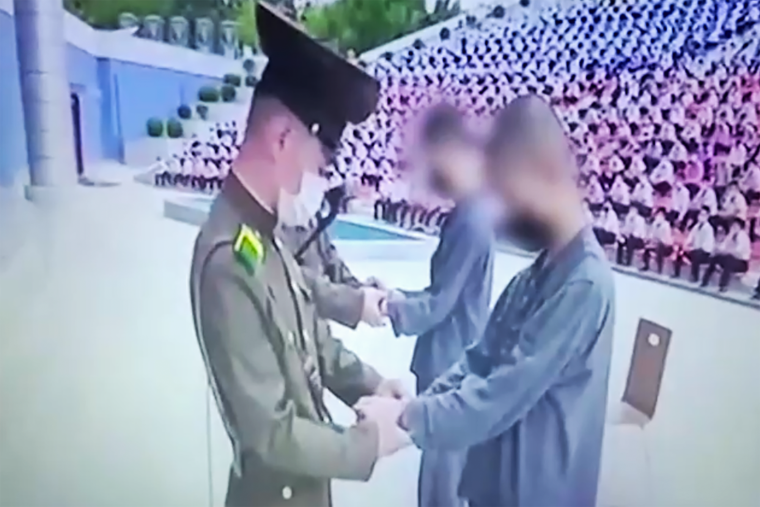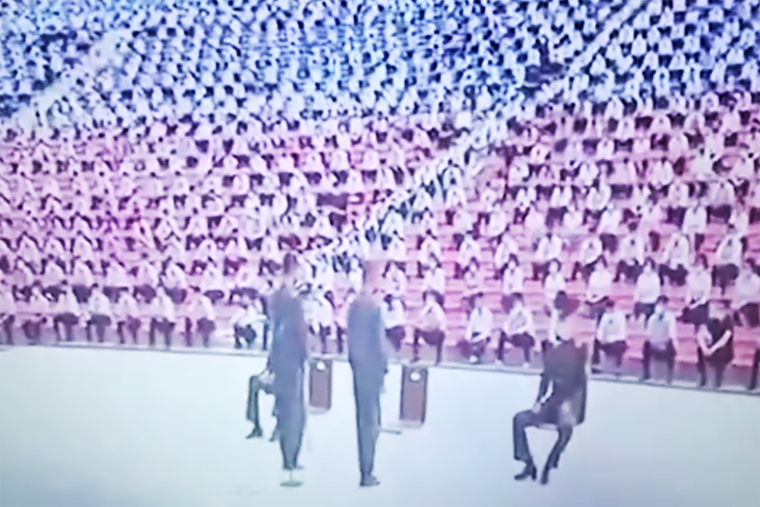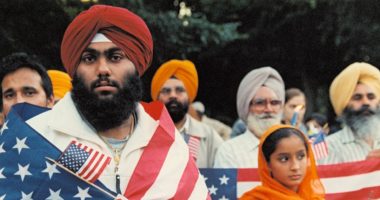A video from inside North Korea shows two teenagers being publicly sentenced to 12 years of hard labor for watching Korean TV dramas, a rare glimpse into Kim Jong Un’s reclusive state that comes as its neighbor reports a soaring number of defectors since 2021.
In this video, two 16-year-olds in gray jumpsuits are seen standing in front of hundreds of students in a stadium, with uniformed officers criticizing them for not “deeply reflecting on their mistakes.”
Videos or photos like this are rare for people outside North Korea, as residents are not allowed to leak any evidence of life to other countries. Travelers are also required to follow designated routes, and places where photography is allowed are severely restricted.

This video — first reported by the BBC — was obtained by NBC News from the South and North Development (SAND) Institute, a think tank that works with defectors. Choi Kyong-hui, president of the institute, believes that the video may have been edited in 2022. NBC was not able to verify this video or confirm the charges independently.
Choi, who defected from North Korea in 2001, believes that the video is being used to threaten North Koreans, “hoping it would stop them from sharing and watching K-drama and listening to K-pop.”
It is not uncommon for North Korea — the most isolated country in the world — to put residents behind bars for viewing or keeping anything related to South Korean culture.
North and South Korea have technically remained at war since 1953, when an armistice ended the 3-year-long Korean War. Leaders from both sides have officially sought reunification for decades.
On Tuesday, North Korean leader Kim Jong Un said the North would no longer seek reunification with the South, according to KCNA, the state-run news agency.
In the video, a narrator repeatedly said, “The rotten puppet regime’s culture has spread even to teenagers,” referring to South Korea.
“They are just 16 years old, but they ruined their own future,” the narrator added. Officers also revealed their names and home addresses in the video.
North Korean defectors are one of the sources for the outside world to glimpse life in the secretive nation, which became even more isolated when it closed its borders in 2020 due to the pandemic. Tourists from Russia will soon be the first known visitors to enter the country since the lockdown, officials announced earlier this month.
The number of North Korean defectors entering the South last year was 196, triple the number of the previous two years, according to South Korea’s Unification Ministry. In 2019, the figure reached 1,029.

The video, officially titled “Let’s Intensify Efforts to Eradicate All Forms of Reactionary and Non-Socialist Phenomena,” reinforces a law enacted in 2020.
The Reactionary Ideology and Culture Rejection Act, cited in this video, would allow the officials to sentence violators to capital punishment for importing or distributing books or any other materials showing South Korean culture.
Choi said it is difficult to know how many people have been punished under this law, in part because enforcement is not consistent. She noted that the North Korean government launches campaigns against South Korean culture to “divert attention from some real domestic issues, usually economic hardship, or when things are not going well with South Korea.”
“From what I know so far,” Choi said, “the few people put to death related to circulating K-drama and K-pop were the vendors, who would sell or distribute the CDs or USBs. The focus of the [North Korean] government’s law is to stop circulation.”
The new law represents a tightening of the rules governing viewing and distributing South Korean dramas or music videos.
In the past, juveniles would be sent to labor camps rather than prison, and punishment mostly did not exceed five years.
In 2018, many South Korean musicians, including the popular girl band Red Velvet, were even invited to perform in Pyongyang in front of hundreds of other citizens and Kim. At the time, the North Korean leader reportedly clapped his hands and said he was “deeply moved” by their performance.
Since then, the government has criticized North Korean women who follow “foreign” styles, like shorts, slippers or dyed hair.
Choi, however, believes the crackdown will be momentary. “I believe that no matter what KJU does to quell South Korean cultural influence, he will fail,” she said, referring to Kim.
“When the government launches a campaign to purge South Korean entertainment, people will stay low. But once it is over, people will go back to watch K-drama and listen to K-pop,” Choi said.
Source: | This article originally belongs to Nbcnews.com









